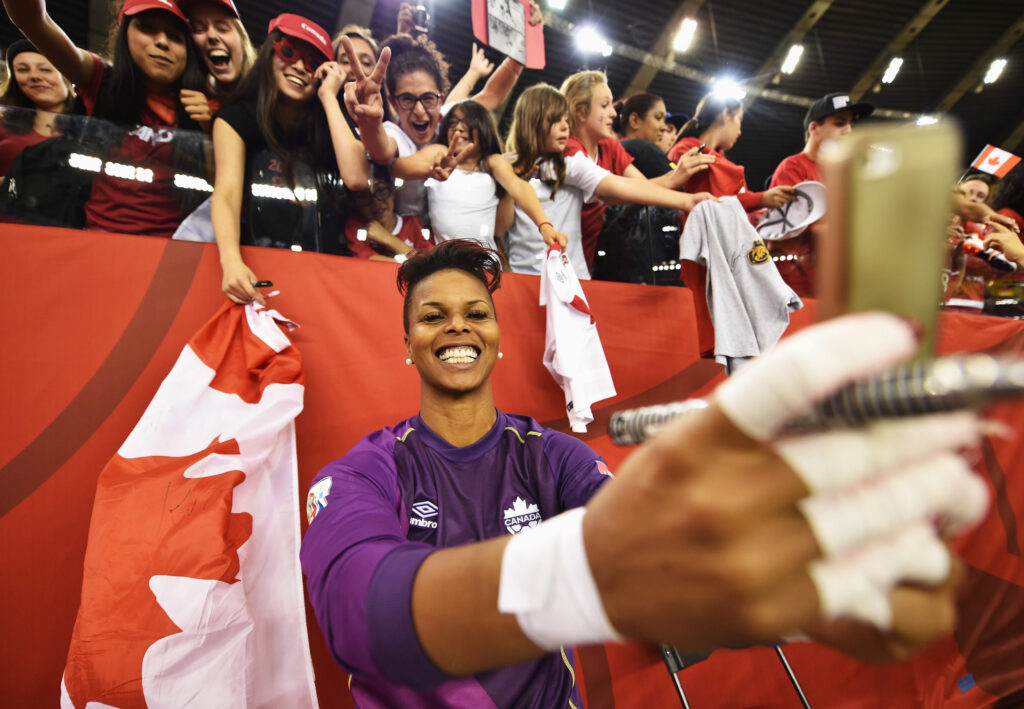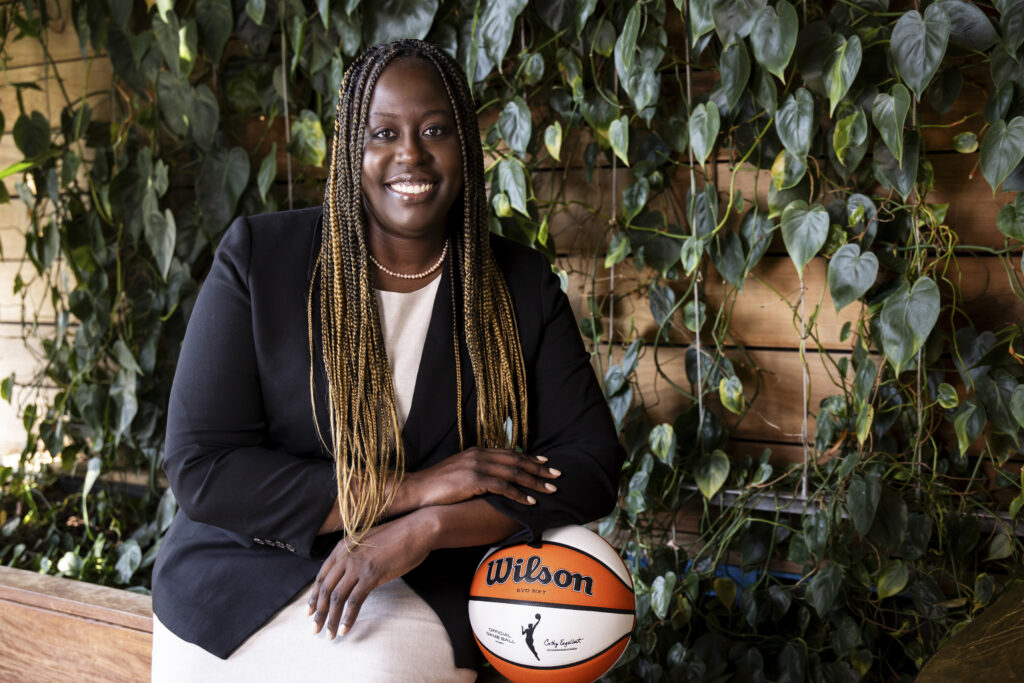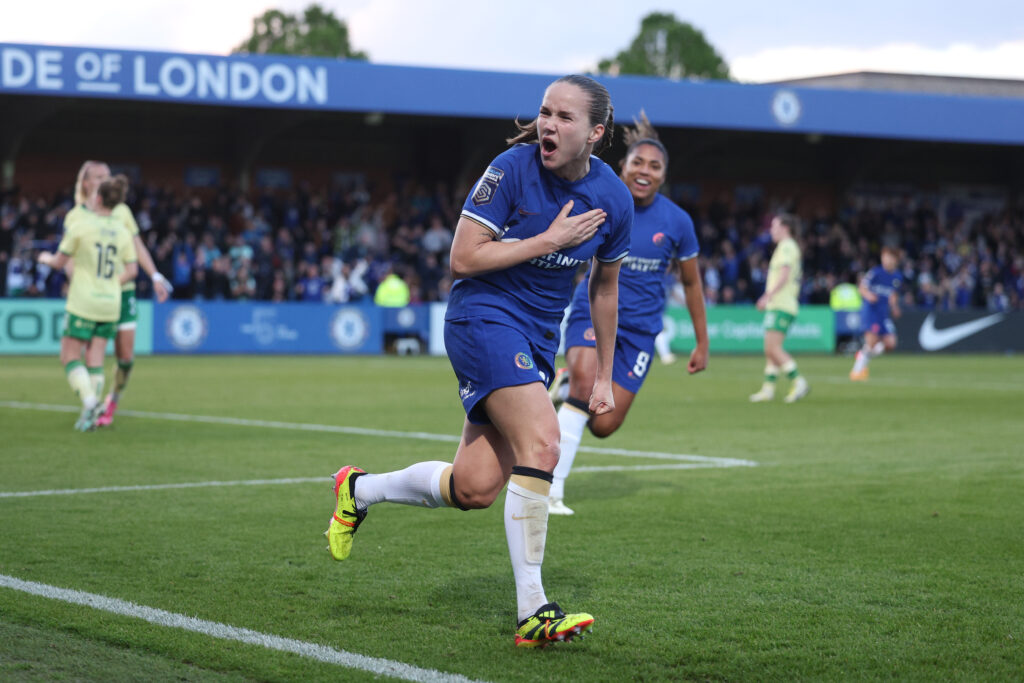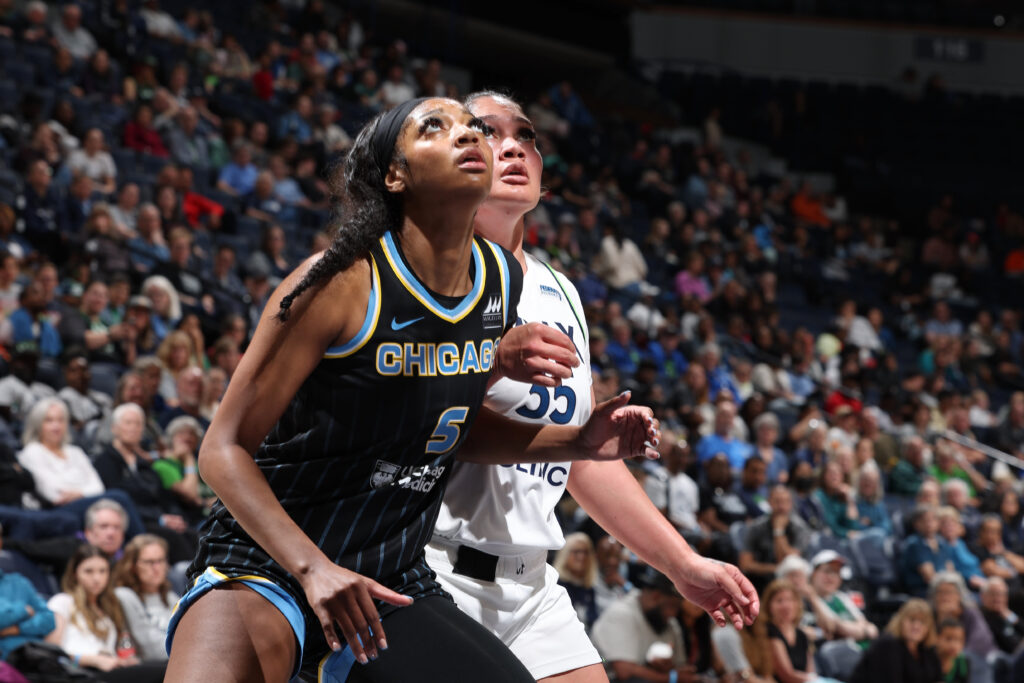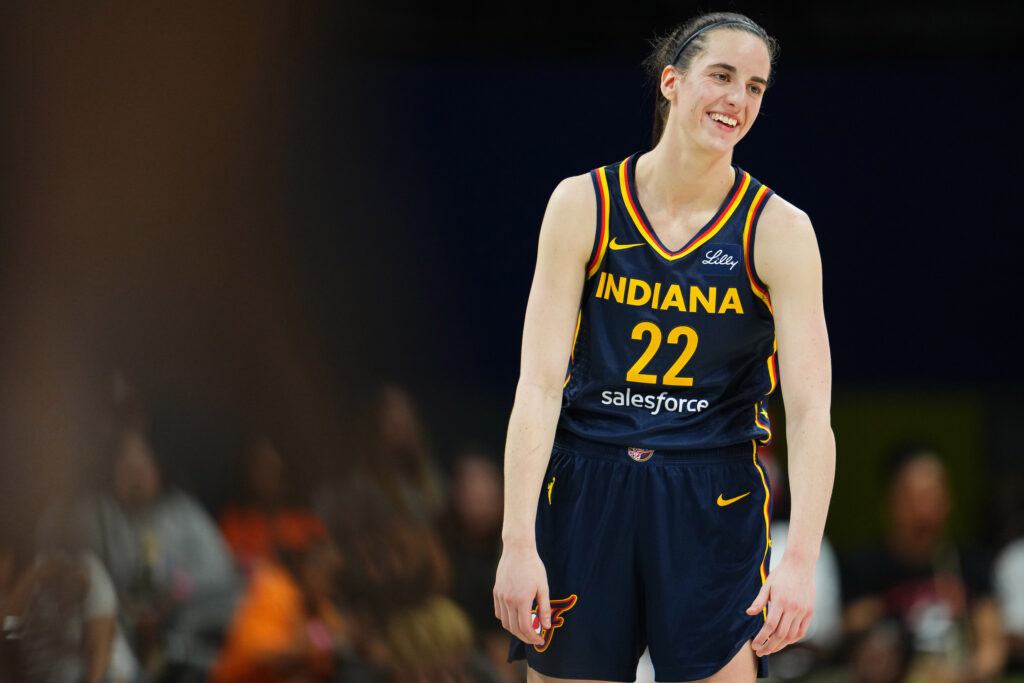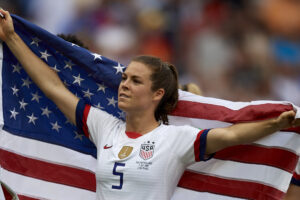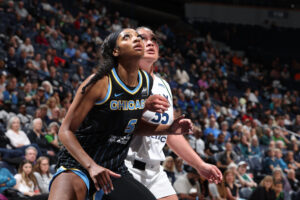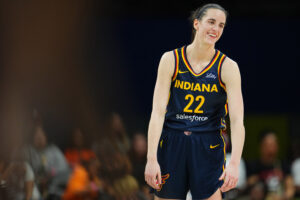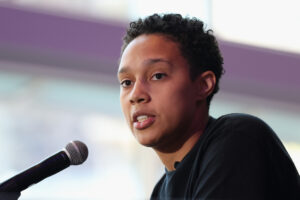Karina LeBlanc is a retired soccer goalkeeper who recorded 110 caps with the Canadian national team, playing in five World Cups and two Olympics. LeBlanc won a gold medal at the 2011 Pan Am Games and a bronze at the 2012 Summer Olympics. She is now the head of women’s football for the CONCACAF as well as a UNICEF ambassador, motivational speaker and TV commentator. Below, she spoke to JWS about a recent health scare, her life as a new mother, and the future of women’s football.
You became a mother this past spring, but had to be separated from your daughter for over two-weeks due to a COVID-19 scare. Can you describe what happened for those who don’t know?
So I was pregnant when the pandemic hit. And a week after giving birth to my daughter, Paris, I started experiencing weird things. And everybody always says like, “You swell up after,” but as an athlete, you know your body. We know when something is off. Even though I’d never given birth, I knew something was off.
And I remember watching Serena Williams talk about her story and how, because she knew her body, she had helped save her own life after giving birth. I told my husband, “Can you make sure you watch the Serena story? Because I just want to make sure.” I ended up having shortness of breath. I ended up calling the doctor, and she’s like, “Okay, well, we’ll just check in with a heart specialist, because that seems a little odd.” And as soon as I called that doctor they were basically like, “Listen, you need to go to the hospital right now, you do not have time to wait for an ambulance.” To be honest with you, as we were driving to the hospital, I thought, “This is it.” And I was trying to catch my breath. I said my goodbye speech to my husband and our little girl, she was squeezing my finger.
I was diagnosed with pleural effusion from heart failure. After three days in the ER, they were ready to release me. And so I thought that morning I was going to get out, I was like “Yes! Here we go!” It was like Christmas. I get to go home to my new baby girl. And next thing I know the doctor is on the phone telling me, “Listen, there’s been an outbreak. I can’t come to release you. There’s a doctor there who will release you, you’re going to get to go home but you can’t see your daughter, we suggest you self-quarantine for two weeks because we are not sure if you have the virus.” And I went from the highest high to the lowest low.
Had you ever experienced anything like those two weeks mentally, or was that a totally new challenge?
So I go through the two weeks, and you learn a lot about yourself in those times. For me, I’ve always known the importance of mindset and perspective because that’s what you learn as an athlete. You have to have your mind right. And as a goalkeeper in soccer, the mind was one of the most dangerous or most powerful things. I checked in with my former teammates, we had a couple of Zoom calls. Just trying to get my head right. And if there’s anything I learned, it’s just how strong we are as women, as human beings. And in that time I think my greatest lesson was, obviously my faith, but also that we are stronger than we think, and we can get through this. And I had the light at the end of the tunnel with Paris, which was great.
You wrote a very candid and moving open letter to your daughter. Can you talk about the motivation behind that letter? Why did you feel like it was important to also share that with the world?
As an athlete and especially on a team sport, it’s almost like you’re used to having people around that are family, that are a community, you know? Obviously my husband was taking care of everything as I was self-quarantined, and all the kudos to him because here’s a first time father taking care of a newborn. But I felt, in some aspects, alone. And so I reached out to social media and I’m like, “I just want prayers and your thoughts.” And I remember my husband coming in the next morning, because, again, I had to keep my phone away from me because I had to keep my blood pressure down and you never know what triggers things. He’s like, “Listen, babe, your video has a lot of views. So I’m going to just tell you that. I know you’ve been wanting to look at it, but also be mindful that there are a lot of requests right now for you to speak.”
And the requests ranged from the media, to fans, to people asking me to help get the message out about the importance of staying home. And for me, I’ve always been connected to this idea of living my purpose and living my why. So there was that aspect. But then there was the George Floyd killing and the conversations on race. It was just so much, and it was like, “Where’s my voice in this?” I’m trying to figure it out. Because here I am Canadian, I’m Caribbean, I’m American. I’m a new mother. There’s just so many aspects going into this identity.
But the one thing I came back to was, “Listen, I want my daughter to know how amazing she is already. I want her to know our story so far, and let her understand the strength that she has.” Because, at three days old, she already made me a stronger and better version of myself. And for me it was just important to write it, but then also I wanted to share it because so many people helped me along the way to stay strong. And it’s interesting, after I wrote it, so many mothers and women reached out to me, it was incredible. I’m almost getting emotional thinking about it. Obviously a lot of former teammates reached out. A lot of people I played against. A lot of people in the sports world. But also just mothers who were either pregnant or mothers who had gone through it, or women talking about how it helped them to feel a strength within. And dads. All the reactions were beautiful. It was more than I thought. When I wrote it, I said to myself, “Okay, I’ll just put it out there.” I didn’t expect the reaction. But I mean, in this day and age, it’s so important for us to sit back and realize that what we have in front of us is gold, and not always focus on what we don’t have in front of us.
And how is your daughter doing now?
She brings so much joy to our lives. So she’s fantastic, she’s thriving.
I’m thrilled to hear that. Switching gears to soccer, you competed in 5 World Cups and 2 Olympic Games. Now that you’re retired, what are some of the moments you find yourself looking back on most frequently?
I think in my position now as head of women’s football, or soccer as we know it, at CONCACAF, it’s the power of the game and the impact it had on me. I was the shyest kid. Nobody ever believes this, because now you throw me in front of a thousand people, and I’m like, “What’s up!” But I was the shyest kid, you couldn’t get me to speak. And life changed when I kicked a ball.
Yes, I went on to win an Olympic medal and play in World Cups and do some incredible things, but now looking back at it, as an athlete, I was always asking myself, “What am I doing this for?” And when I was playing, it was to inspire that next generation, because as a young girl, I didn’t have any female athletes to look up to. That meant I never said no to an autograph or to a moment with a fan. That five seconds, to a young girl, could be a life-long, game-changing moment.
When I retired, it was, “Okay, now what? Who am I now?” I knew I always wanted to impact people for the better. And so with this position now, I’m able to be the head of women’s soccer in CONCACAF. That’s 41 countries. And while, in the US and Canada, the conversation surrounding women is how to achieve equality, when you travel to some of our other countries, it’s talking about the power of sport for this young girl. It’s showing how sport can help her become what she’s meant to be on this earth. Sport can give her a voice. Sport can give her purpose.
For me, it’s my truth. So it’s easy for me to talk about, “Let’s create more women who are stepping up and being bold and understanding who they are because of the game.” When I look back, it’s not necessarily the accolades that are the most important thing. It’s the fact that I found my voice, and now I want to use it to create more avenues so that sport can be a game changer for other young girls in this world.
You also played in the NWSL, which just became the first team sports league in America to safely return to play during COVID. How has that league grown since your time playing?
I was fortunate enough to be a part of the Fox crew and do the broadcast of the World Cup last June in France. That was game changing for women’s soccer. After, we thought it was going to be like, “Oh, here we go, taking off.” But then the pandemic hit. I think what you’ve seen is amazing leadership in Lisa Baird, as well as the owners, in stepping up and being bold. I think anybody who ever played soccer was jumping for joy when the NWSL set the trend and was successful. The way that it did it was fantastic, because it showed commitment. And it’s a testament to everybody who was a part of it. So I’m really excited about the momentum we now have in the women’s game.
What does your job usually entail, and how has it changed given the ongoing pandemic?
The CONCACAF is the Confederation of North, Central American and Caribbean countries. FIFA is the governing body for all of football, and then FIFA’s broken up into six confederations.
So we are 41 countries with 41 different realities, and my job is women’s football. It’s a new position, and I’m the first to fill it. Obviously, the priorities with women’s football are to help develop and grow it across all of our members’ associations. I retired after the World Cup in 2015, where there were sold out stands, and men and women wearing our jerseys. But when I started playing, there were like eight people in the stands, and five were my family. So I have firsthand seen the growth of the game, especially in the US and Canada. But then when you travel across the region, there’s still a lot of work to do to change public perception and start the conversation about how we grow participation. For us, there are three objectives: change perception, increase participation, and build sustainable foundations.
We also deliver programs to qualify for a World Cup or Olympics, where teams have to go through our tournaments. So there’s a competition side, but we’re also trying to empower young girls through the sport of football. After the pandemic began, I was on maternity leave, but we were able to develop and deliver online webinar learnings. And we were the only Confederation to do that. For us, it’s important to engage on the woman’s side. We figure out who is in charge of women’s football in a certain country and we connect with her, empower her and engage with her. With the World Cup being as big as it was last year, we have to continue to move forward. The time is now for women in sports.
What do you think will be some of the biggest storylines in women’s soccer over the next decade?
I think you’re going to keep seeing more breakthroughs. The game’s going to become better, deeper, stronger. You’re going to see sponsorships step in and help the game grow. And again, you’re going to see participation grow. Because I think people are starting to see A, the power of sports, and B, the game changing opportunities they provide to young girls.
Through my UNICEF days, I saw that if you empower a girl, you empower a community. And for me, I was able to go into some parts of the world where you drop a soccer ball and everything is solved. There are no political fights, there’s no religion. It’s just the young kids who want to play. And I think more and more people will see that there are all these things that try to separate us, but you can drop a ball and everybody comes together.
I’m a firm believer of what the game can do for a young girl and a firm believer of what the game can do for a community. And, for me, if I can play a role in any of that, it’s a big deal.
Is there anything else that you wanted to mention that I maybe didn’t bring up?
I just think that in these interesting times, I’m a firm believer that what we do, and the conversations we have, and what we push, and the actions we take are so important. As a new mother, especially talking with you guys, it’s so important to tell the stories of girls and women. The good, the bad and the ugly, but especially the stories that are inspiring. So I’m thankful to you for doing that. And I hope everyone who reads this article is able to find their purpose in growing the attention around women in sports and their purpose in making it better for the next generation.
I feel like it’s so perfect that you have a daughter!
You know what’s so funny? When we found out, I named her Paris because last summer’s World Cup was so powerful for us, and obviously that was where she was conceived. But every time I told people, they’re like, “Of course. You know what? God wouldn’t have it any other way.”
